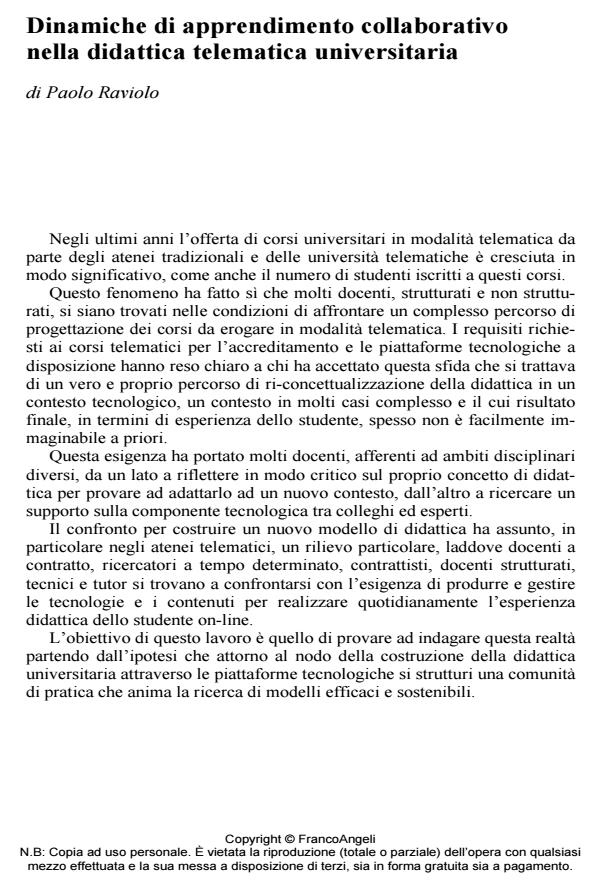Dynamics of Collaborative Learning in On-Line University Teaching
Journal title EDUCATIONAL REFLECTIVE PRACTICES
Author/s Paolo Raviolo
Publishing Year 2016 Issue 2016/2
Language Italian Pages 20 P. 126-145 File size 212 KB
DOI 10.3280/ERP2016-002009
DOI is like a bar code for intellectual property: to have more infomation
click here
Below, you can see the article first page
If you want to buy this article in PDF format, you can do it, following the instructions to buy download credits

FrancoAngeli is member of Publishers International Linking Association, Inc (PILA), a not-for-profit association which run the CrossRef service enabling links to and from online scholarly content.
The last years have seen a strong increase in the offering of on-line courses by Italian universities (105 courses, about 56.000 students enrolled in 2016), among who teach in universities many have found themselves to re-design their courses for Learning Management Systems (LMS). The requirements for course accreditation and the LMS constrains have given rise to a re-conceptualization of the teaching models in a complex and multidisciplinary context. The aim of this work is to investigate this scenario assuming that the reconceptualization of university teaching for on-line structures triggered a community of practice (CoP) that animates the search for effective and sustainable models. The first step of the research is a questionnaire to find out the key features of a CoP, the early results seem to confirm the existence of informal learning dynamics, common objectives and an interdisciplinary identity dimension typical of communities of practice, while the borders perception and the relations with the outside looks more nuanced and yet to be explored
- Alessandrini G. (2007). Comunità di pratica e società della conoscenza. Bologna: Carocci.
- Angori, S. (2011). Nuovi media e formazione. PROSPETTIVA EP, vol. 32. pp. 99-110.
- Argyris C. (1999). On Organizational Learning. 2nd ed. A cura di: Malden, Mass. Blackwell Business.
- Argyris, C., D. A. Schön (1978). Organizational Learning: a theory of action perspective. Addison Wesley.
- Fabbri L. (2007). Comunità di pratiche e apprendimento. Per una formazione situata. Bologna: Carocci.
- Fabbri, L. (2012). Le pratiche professionali. Progettazione e apprendimento nei contesti lavorativi. Bologna: Carocci.
- Gherardi, S. (2008). Apprendimento tecnologico e tecnologie di apprendimento. Bologna: Il Mulino.
- Hampel, T., R. Keil–Slawik (2001). sTeam: Structuring Information in Team–Distributed Knowledge Management in Cooperative Learning Environments. Journal of Educational Resources in Computing. Vol.1, No. 2.
- Leslie B, M. K. Aring, B. Brand (1998). Informal learning: The new frontier of employee & organizational development. Economic Development Review, ABI/INFORM Global, vol.15, n. 4, pp. 12-18.
- Loewenstein, M. A., J. R. Spletzer (1999). Formal and informal training: evidence from the NLSY. Research in labor economics: RLE Bingley, Emerald, Vol. 18, p. 403-438.
- McCall, M. W., M. M. Lombardo (1998). A. M. Morrison. The lessons of experience. Lexington Books.
- Mezirow, J. (2000). Learning as transformation: Critical Perspectives on a theory in Progress. Jossey-Bass Inc.
- Muller, M., K. Ehrlich, T. Matthews, A. Perer, I. Ronen, I. Guy (2012). Diversity among enterprise online communities: collaborating, teaming, and innovating through social media. Proceedings of the CHI 2012, New York, ACM, pp. 2815-2824.
- Nonaka I., H. Takeuchi (1995). The Knowledge Creating Company. Oxford University Press.
- Notti, A. (2012). La ricerca empirica in educazione. Metodi, tecniche e strumenti. Lecce: Pensa editore.
- Raviolo, P. (2012). Adult education e social media. Strategie di apprendimento per le comunità professionali. Milano: Franco Angeli.
- Rossi, B. (2008). Pedagogia delle organizzazioni. Il lavoro come formazione. Milano: Guerini & Associati.
- Wenger, E. (1998). Community of practice, Learning, Meaning and Identity, Cambridge University Press.
- Wenger, E. (2000). Comunità di pratica e sistemi sociali di apprendimento. In «Studi organizzativi», 1, pp. 11-34.
- Wenger, E., N. White, J. D. Smith (2009). Digital Habitats. Stewarding technology for communities. Portland, Cpsquare
- Higher Education Learning Methodologies and Technologies Online Fiorella Vinci, pp.733 (ISBN:978-3-031-29799-1)
Paolo Raviolo, Dinamiche di apprendimento collaborativo nella didattica telematica universitaria in "EDUCATIONAL REFLECTIVE PRACTICES" 2/2016, pp 126-145, DOI: 10.3280/ERP2016-002009